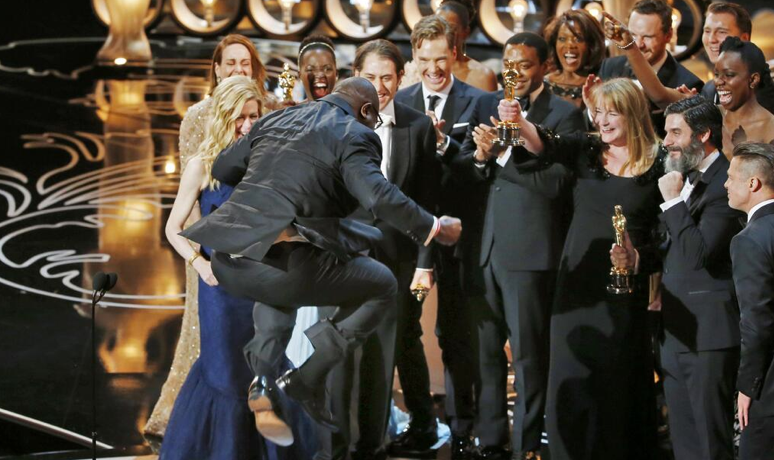’12 Years a Slave’ Takes Top Spot at Oscars
03 Mar, 2014
The slavery drama “12 Years a Slave” won the Academy Award for best picture on Sunday, making history as the first movie from a black director to win the film industry’s highest honor in 86 years of the Oscars.
British director Steve McQueen’s unflinching portrayal of pre-Civil War American slavery won two other Oscars, including best supporting actress for newcomer Lupita Nyong’o and best adapted screenplay based on the memoir of Solomon Northup, a free man tricked and sold into slavery in Louisiana.
“Everyone deserves not just to survive but to live. This is the most important legacy of Solomon Northup,” said McQueen in his acceptance speech.
“12 Years a Slave,” prevailed over space thriller “Gravity” from Mexican filmmaker Alfonso Cuaron, which nevertheless racked up the most Oscars of the night with seven, including the best director honor for Cuaron, a first for a Latin American director.
The film starring Sandra Bullock as an astronaut lost in space swept the technical awards like visual effects and cinematography, a reward for its groundbreaking work on conveying space and weightlessness.
Referring to the “transformative” experience he and others undertook in the four-plus years spent making “Gravity,” Cuaron, whose hair is graying, said, “For a lot of these people, that transformation was wisdom. For me, it was just the color of my hair.”
In one of the strongest years for film in recent memory, the 6,000-plus voters of the Academy of Motion Picture Arts and Sciences scattered golden Oscar statuettes among the many acclaimed movies in contention.
It was a good night for the scrappy, low-budget film “Dallas Buyers Club,” a biopic of an early AIDS activist two decades in the making that won three Oscars, including the two male acting awards.
Matthew McConaughey, in a validation of a remarkable career turnaround, won best actor for his portrayal of the homophobe turned AIDS victim turned treatment crusader Ron Woodroof, a role for which he lost 50 pounds (23 kg).
His co-star, Jared Leto, won best supporting actor for his role as Woodroof’s unlikely business sidekick, the transgender woman Rayon, for which he also slimmed down drastically.
Australia’s Cate Blanchett won the best actress Oscar for her acclaimed role as the socialite unhinged by her husband’s financial crimes in Woody Allen’s “Blue Jasmine.”
“As random and subjective as this award is, it means a great deal in a year of, yet again, extraordinary performances by women,” said Blanchett, who beat out previous Oscar winners Bullock, Amy Adams, Judi Dench and Meryl Streep.
The big loser of the night was director David O. Russell’s 1970s crime caper “American Hustle,” which walked away empty-handed despite earning 10 nominations, the same number as “Gravity.” Martin Scorsese’s tale of financial greed, “The Wolf of Wall Street,” also failed to take home Oscars.
The tale of Nordic princesses, “Frozen,” won best animated film, a first for Disney Animation Studios since the category was introduced in 2002, and its girl-power anthem “Let It Go” won best original song.
For best foreign language film, Italy took its 11th Oscar in that category with “The Great Beauty,” a visually stunning film about life in Rome and a writer in crisis.
Comic and talk show star Ellen DeGeneres returned as Oscar host on Sunday, bringing a deadpan affability, and pizza, to the Academy Awards show while still poking fun at Hollywood royalty.
Kenyan actress Nyong’o was one of the big stars of the night, not only for her winning pale blue Prada gown on the red carpet, but also for her touching speech.
In accepting the first award of the night for “12 Years a Slave,” Nyong’o, 31, paid homage to her character, who picked more cotton than anyone else but suffered at the hands of her besotted yet evil master.
“It doesn’t escape me for one moment that so much joy in my life is thanks to so much pain in someone else’s, and so I want to salute the spirit of Patsey, for her guidance,” a tearful Nyong’o told the audience.
Sunday capped an unusually long awards season, extended by the Winter Olympics, and for “12 Years a Slave” it spells the end of six months of both high acclaim and uncertainty over awards stemming from the perception that it was a hard film to watch.
Reuters
Image John Shearer/Invision/AP
Mentioned In This Post:
About the author
Related Posts
-

The Return of Power
-

Records May Be Broken At This Years AMAs
-

Will Miami's Epic Club Scene Survive COVID?
-

Bill Burr on SNL Got People Big Mad!
-

SNL is Back with Some Familiar Faces
-

Post Leads The Way To The Billboard Awards
-

Pandemic or Not, The Show Must Go On
-

Damn Jada, Just Damn
-

Star Actress Feared Dead
-

The Culture Can't Be Cancelled









